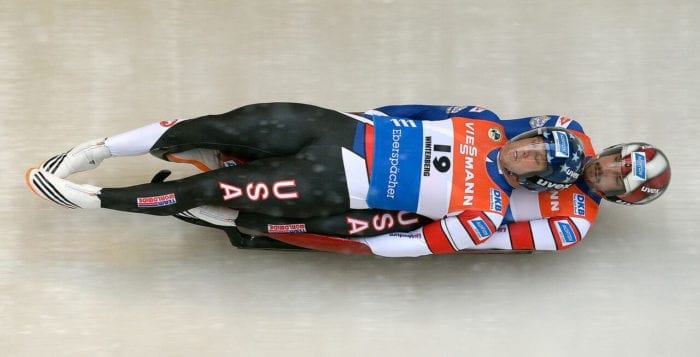Former area Olympians reflect on the recent games

After athletes from around the world raced across and flew over ice and snow in Beijing, much of it manufactured, some Olympians are likely to need to adjust to a return to their everyday life.

Two-time Olympian Matthew Mortensen, who competed in Sochi, Russia, in 2014 and in Pyeongchang, South Korea, in 2018 in the luge, suggested that the competitors coming back needed to give themselves time to settle back into their routines.
While he cautioned that he couldn’t speak for all athletes, he described how “you are going so hard for so long during any season. One capped by the Olympic Games brings even more adrenaline and mental stress. Once it was over for me, I just felt emotionally and mentally drained.”
Mortensen, who grew up in Huntington Station and now lives in Connecticut, spent March and April of each Olympic year focusing on his physical and mental recovery.
As with each Olympics, the 2022 Games in Beijing had its own storylines and challenges, as American athletes traveled across the world without support networks who couldn’t attend because of strict COVID rules.
“With COVID restrictions and protocols, lack of spectators, a diplomatic ban, differences in how long athletes could stay at the games after their [events] had finished, etc., I couldn’t help but feel like the athletes at this Olympics were not getting the ‘full experience,’” Mortensen explained in an email. “That being said, I’m sure it was still wonderful for them.”
Indeed, Stony Brook University graduate student India Pagan, who is a stand-out starting basketball player and is earning her master’s degree, attended her first games in Tokyo as a representative of the first Puerto Rican basketball team to compete in the Olympics last summer.
“It crossed my mind, what would these [games] be like if we didn’t have all these COVID restrictions, how much more fun it would have been,” she said.
Still, Pagan, who had routine COVID and temperature tests and had to show her badge regularly, called the experience a “blast.”
While Pagan said she, too, was “sad” when the Olympics were over, she said she was “thankful” she got to participate and appreciated the reception she received when she returned, which included a parade in her native New London, Connecticut.
“I’m an Olympian now,” she said. “It’s a different life. People see the tattoo on my leg, and they say, ‘Can I take a picture with you?’”
Russian skater
Mortensen and Pagan said they both were well aware of some of the storylines that dominated the Beijing games.
One of the biggest narratives involved 15-year-old Russian skating sensation Kamila Valieva. After the team event, in which the Russian Olympic Committee won a gold medal while the United States earned a silver, Valieva tested positive for a banned substance.
The International Olympic Committee allowed her to compete in the individual skating event, where she was first after the short program, but fell in the long program and finished in fourth, behind two of her teammates.

Like many other athletes and commentators, Mortensen believed Valieva shouldn’t have been competing after her positive test.
“There has to be a hard line on doping, especially when it comes to the Olympic Games,” Mortensen wrote. “The adults around her let her down and the Court of Arbitration for Sport made the wrong decision.”
He said he couldn’t imagine competing knowing that her competitors felt like she was a cheater. He expected that the mental trauma she experienced would be “long lasting.”
Pagan said Team USA officials warn athletes to be careful about anything they take that might lead to a positive drug test.
“You never know what type of substances could be illegal,” Pagan said. “You have to be very careful.”
Love for the Games
Mortensen said he watched the Games every day, getting up early to support his former teammates live.
“I still love the Olympics and everything that the Games represent,” he wrote in an email. He finds them “fascinating” and enjoys cheering on Team USA.
In addition to lasting memories, Mortensen and Pagan both appreciate the camaraderie and friendships that came from participating in a marquee athletic event on the world stage.
“In our sport, we find ourselves competing against most of the same athletes for our entire career,” Mortensen wrote. “We travel together, hang out together, play sports together and just spend a lot of time around each other in general over the years,” which helps build enduring friendships.
Just hours after the competition, Pagan said she and other Olympians interacted in the game room.
“We do everything we can for our country” and then they connect with other people who are doing the same, she said.
Pagan said she has stayed in touch with several members of the South African track team and with a wrestler from Australia.
One of her new friends asked her if she thought she’d be able to see each other in person again.
“Maybe life will bring us back together,” Pagan said. “It’s cool that we’re still friends.”






